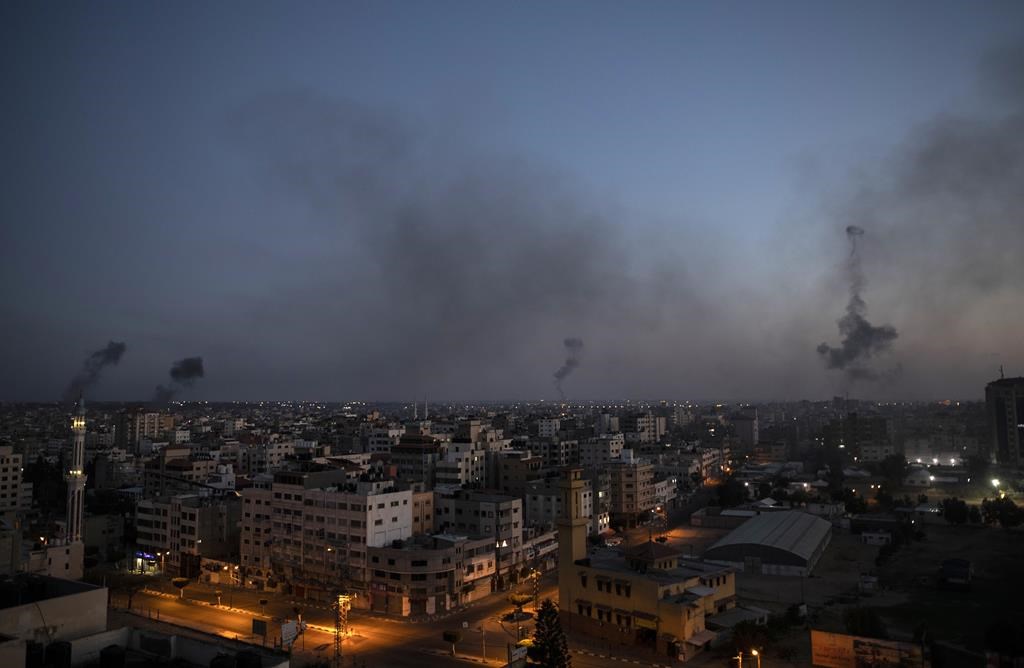
Israel on Thursday said it was massing troops along the Gaza frontier and calling up 9,000 reservists ahead of a possible ground invasion of the Hamas-ruled territory, as the two bitter enemies plunged closer to all-out war.
Posted May 14, 2021, 05:28AM EDT
Israel on Thursday said it was massing troops along the Gaza frontier and calling up 9,000 reservists ahead of a possible ground invasion of the Hamas-ruled territory, as the two bitter enemies plunged closer to all-out war.
This follows a clarification from Israeli officials that there are “currently” no ground troops inside Gaza, citing an “internal communications” error that informed reporters that Israeli ground troops had entered the territory.
Egyptian mediators rushed to Israel for cease-fire efforts but showed no signs of progress.
The stepped-up fighting came as communal violence in Israel erupted for a fourth night, with Jewish and Arab mobs clashing in the flashpoint town of Lod.
The fighting took place despite a bolstered police presence ordered by the nation’s leaders.
The four-day burst of violence has pushed Israel into uncharted territory — dealing with the most intense fighting it has ever had with Hamas while simultaneously coping with the worst Jewish-Arab violence inside Israel in decades.
A late-night barrage of rocket fire from Lebanon that landed in the sea threatened to open a new front along Israel’s northern border.
Early Friday, the Israeli military said air and ground troops struck Gaza in what appeared to be the heaviest attacks yet.
Masses of red flames illuminated the skies as the deafening blasts from the outskirts of Gaza City jolted people awake.
The strikes were so strong that people inside the city, several kilometers away, could be heard screaming in fear.
“I said we would extract a very heavy price from Hamas,” Prime Minister Benjamin Netanyahu said in a videotaped statement. “We are doing that, and we will continue to do that with heavy force.”
The fighting broke out late Monday when Hamas, claiming to be the defender of Jerusalem, fired a barrage of long-range rockets toward the city in response to what it said were Israeli provocations.
Israel quickly responded with a series of airstrikes.
Since then, Israel had attacked hundreds of targets in Gaza. The strikes set off scores of earth-shaking explosions across the densely populated territory.
Gaza militants have fired nearly 2,000 rockets into Israel, bringing life in the southern part of the country to a standstill.
Several barrages targeted the seaside metropolis of Tel Aviv, some 70 kilometers away.
Gaza’s Health Ministry said the death toll has climbed to 103 Palestinians, including 27 children and 11 women, with 530 people wounded.
The Hamas and Islamic Jihad militant groups have confirmed 20 deaths in their ranks, though Israel says that number is much higher.
Seven people have been killed in Israel, including a 6-year-old boy.
In Washington, President Joe Biden said he spoke with Netanyahu about calming the fighting but also backed the Israeli leader by saying “there has not been a significant overreaction.”
He said the goal now is to “get to a point where there is a significant reduction in attacks, particularly rocket attacks that are indiscriminately fired into population centers.”
He called the effort a “a work in progress.”
Thursday’s visit by Egyptian officials marked an important step in the cease-fire efforts.
Egypt often serves as a mediator between Israel and Hamas, and it has been a key player in ending past rounds of fighting.
The officials met first with Hamas leaders in Gaza before holding talks with Israelis in Tel Aviv, two Egyptian intelligence officials said.
They spoke on condition of anonymity because they were not authorized to talk to the media. Hamas’ exiled leader, Ismail Haniyeh, was also in touch with the Egyptians, the group said.

Despite those efforts, the fighting only intensified. Israeli aircraft pummeled targets in Gaza throughout the day.
And late Thursday, Israel fired tank and artillery shells across the border for the first time, sending scores of terrified residents fleeing for safety.
The airstrikes have destroyed scores of buildings, including three high rises. Israel says the buildings housed Hamas militants or facilities, but civilians were inside as well.
In the northern Gaza Strip, Rafat Tanani, his pregnant wife and four children were killed after an Israeli warplane reduced the building to rubble, residents said.
Sadallah Tanani, a relative, said the family was “wiped out from the population register” without warning. “It was a massacre. My feelings are indescribable,” he said.
Israel has come under heavy international criticism for civilian casualties in Gaza fighting. It says Hamas is responsible for endangering civilians by hiding and launching rockets from civilian areas.
Late Thursday, Israel’s Defense Minister Benny Gantz ordered the mobilization of an additional 9,000 reservists.
The chief military spokesman, Brig. Gen. Hidai Zilberman, said troops were massing along the Gaza border for a possible ground operation.
He said tanks, armored vehicles and artillery were being prepared “for mobilization at any given moment.”
Hamas showed no signs of backing down. It launched several intense barrages of rockets throughout the day and fired its most powerful rocket, the Ayyash, nearly 200 kilometers (120 miles) into southern Israel.
The rocket landed in the open desert but briefly disrupted flight traffic at the southern Ramon airport.
Hamas also launched a drone that Israel said it quickly shot down.
Hamas military spokesman Abu Obeida said the group was not afraid of a ground invasion, saying any invasion would be a chance “to increase our catch” of dead or captive soldiers.
Gaza marks deadly Eid al-Fitr as tensions rise during holiday
The fighting cast a pall over the Muslim holiday of Eid al-Fitr, normally marked by family gatherings and festive meals. Instead, the streets of Gaza were mostly empty.
Hassan Abu Shaaban tried to lighten the mood by passing out candy to passers-by but acknowledged “there is no atmosphere” for celebrating.
“It is all airstrikes, destruction and devastation,” he said. “May God help everyone.”
The current eruption of violence began a month ago in Jerusalem, where heavy-handed Israeli police tactics during Ramadan and the threatened eviction of dozens of Palestinian families by Jewish settlers ignited protests and clashes with police.
A focal point of clashes was Jerusalem’s Al-Aqsa Mosque, built on a hilltop compound that is revered by Jews and Muslims.
Israel regards Jerusalem in its entirety as its capital, while the Palestinians want east Jerusalem to be the capital of their future state.
The violent clashes between Arabs and Jews in Israel resulted in scenes not witnessed in more than two decades.
The confrontations erupted again late Thursday. Jewish and Arab mobs battled in the central city of Lod, the epicenter of the troubles, for a fourth consecutive night, despite a state of emergency and heavy police presence.
A Jewish man was shot and seriously wounded, and Israeli media said a second Jewish man was shot.
In the Tel Aviv neighborhood of Jaffa, an Israeli soldier was attacked by a group of Arabs and hospitalized in serious condition.
The fighting deepened a political crisis that has sent Israel careening through four inconclusive elections in just two years.
After March elections, Netanyahu failed to form a government coalition. Now his political rivals have three weeks to try to do so.
Those efforts have been greatly complicated by the fighting. His opponents include a broad range of parties that have little in common.
They would need the support of an Arab party, whose leader has said he cannot negotiate while Israel is fighting in Gaza.
Naftali Bennett, leader of a small right-wing party, was quoted as saying he did not believe an alternate coalition could be formed in the current atmosphere.
Opposition leader Yair Lapid, who is leading the coalition-building efforts, said the country was facing an “existential threat” and urged Bennett to join him to help rescue the country.
“We are on the brink of the abyss,” he said.





